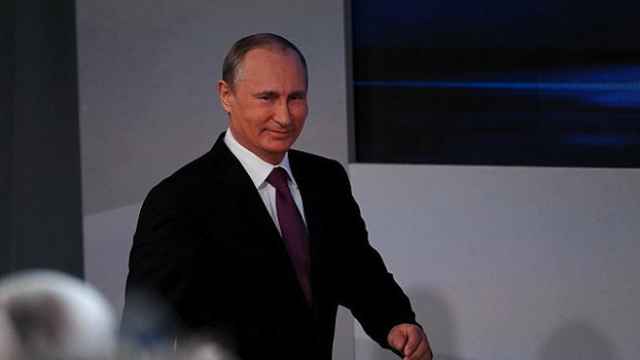Russian firms are scrambling to repay or restructure the terms of foreign currency loans as the ruble's loss of value and an interest rate hike push up the cost of debt servicing.
Many Russian companies increased their share of ruble-denominated debts after the 2008-09 financial crisis, yet some big businesses still owe large amounts of dollars and euros.
Russian corporate debt in hard currency exceeds $600 billion, of which more than $100 billion falls due over the coming year, so some companies will suffer even though the government is unlikely to let a massive default happen.
Exporters that sell their goods abroad and receive payment in foreign currency, such as world-leading nickel and palladium producer Norilsk Nickel, should have a ready supply of funds for debt servicing.
But those with foreign debts and revenues in rubles may be hard hit as they borrow in the weaker Russian currency, paying a high rate after the central bank hiked its key rate to 17 percent, to fund repayments in expensive foreign currencies.
"The lending rate for a quality borrower will be 20 to 21 percent — a level at which a normal borrower will not take loans, it's too expensive. And to a poor quality borrower banks will not lend," a source at a large Russian bank said.
This has forced some companies to look for alternatives.
Pipe manufacturer TMK, which focuses on the domestic market, has 65 percent of its debt in dollars and euros and is trying to find better loan terms.
"TMK is working on debt optimization, talking to all banks about refinancing, studying various options to reduce debt," a spokesman for the pipemaker said.
EuroSibEnergo, a ruble-revenue power firm owned by tycoon Oleg Deripaska, said in 2012 that it owed $1.4 billion to Sberbank, due to be repaid by Feb. 23, 2015.
A financial market source said the company had since amended the loan terms but still has to repay at least a portion of it next year and is in talks with Sberbank about pushing back the repayment date, although it may have to pay a higher rate.
EuroSibEnergo declined to comment.
Sberbank is expecting borrowers in the domestic transport and leasing business to run into trouble in 2015 due to debt repayments, one analyst who attended a meeting with its executives said.
Too Big to Fail
Analysts say worried exporters have held on to as much of their forex earnings as possible while others are racing to convert rubles into dollars or euros, deepening the Russian currency's slide.
The Central Bank said on Wednesday it would provide additional foreign currency funds in a bid to reassure companies worried about impending debt repayments.
"If firms keep taking ruble loans to service foreign debts, we will see the dollar hit new highs to the ruble [as they covert rubles]," said Denis Poryvai, a fixed-income analyst at Raiffeisenbank.
The ruble's slide deepened early this week on concerns that Russia's top oil producer Rosneft, which recently issued a record 625 billion rubles ($10.1 billion) in ruble-denominated bonds, was converting the money it had raised into foreign currency to service debt.
Rosneft, a major exporter suffering from low oil prices, has denied the money would be used to buy dollars. It is expected to repay a $7.6 billion portion of a bridge loan that matures on Sunday within days. Next year, it has to repay $19.5 billion.
If the environment for raising money and foreign debt repayment continues to deteriorate, large companies such as Rosneft are likely to be considered too big to fail by the Russian state.
The Central Bank's announcement that it would accept Rosneft bonds as collateral promptly after its record bond issue led to speculation of preferential treatment. The issue came after Rosneft had tried and failed for months to get money from Russia's National Welfare Fund.
A Message from The Moscow Times:
Dear readers,
We are facing unprecedented challenges. Russia's Prosecutor General's Office has designated The Moscow Times as an "undesirable" organization, criminalizing our work and putting our staff at risk of prosecution. This follows our earlier unjust labeling as a "foreign agent."
These actions are direct attempts to silence independent journalism in Russia. The authorities claim our work "discredits the decisions of the Russian leadership." We see things differently: we strive to provide accurate, unbiased reporting on Russia.
We, the journalists of The Moscow Times, refuse to be silenced. But to continue our work, we need your help.
Your support, no matter how small, makes a world of difference. If you can, please support us monthly starting from just $2. It's quick to set up, and every contribution makes a significant impact.
By supporting The Moscow Times, you're defending open, independent journalism in the face of repression. Thank you for standing with us.
Remind me later.






